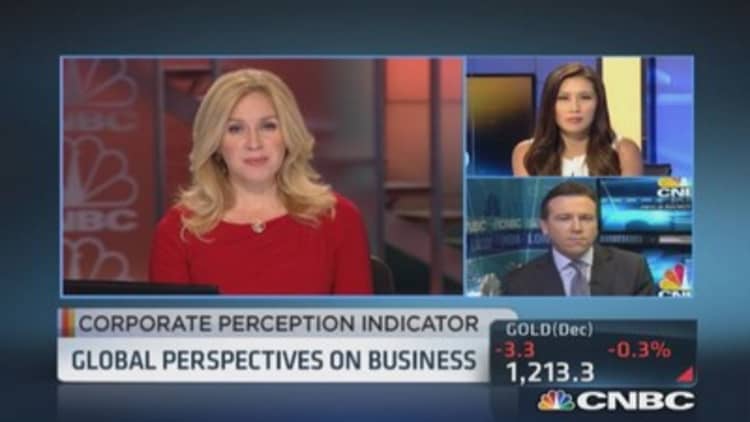
A series of damning espionage revelations and other developments have damaged the way Germans view U.S. corporations—so much so that they now regard American companies about as negatively as Russians do, according to research to be released Monday.
Fifty-seven percent of German business executives surveyed by market research firm Penn Schoen Berland for CNBC and Burson-Marsteller said a corporation's status as American makes them see it less favorably than they would otherwise. Only 29 percent responded with "more favorable."
Read MoreCNBC/Burson-Marsteller Corporate Perception Indicator
The negative perception was also reflected among the general German public, with 59 percent of the 1,010 German citizens surveyed responding with a "less favorable" attitude toward U.S. firms.
Those marks are on par with the way American firms are viewed in Russia, a country that has felt animosity toward the United States for decades and which most recently was slapped with serious economic sanctions by the Obama administration over Russian military operations in Ukraine.
Fifty-four percent of Russian executives and 61 percent of the public there had a "less favorable" perception of a company if it is American.
Anything that supports the notion that U.S. companies tweak the law creates negative perception. There was also a sense that these companies were involved in industrial espionage.Thomas Harjeseconomist, Barclays
American firms have been put in a bad light following a string of controversies involving Germany and the European Union.
Read MoreGermany arrests suspected double agent: Lawmakers
German Federal Minister for Economic Affairs and Energy, Sigmar Gabriel, recently suggested that Google should be broken up, due to its dominance in Internet search across Europe, while the European Commission's antitrust chief, Joaquin Almunia, . (Google has said that it will work with the commission to resolve the concerns.)
Perhaps most damaging, however, are revelations that the U.S. National Security Agency spied on German Chancellor Angela Merkel by tapping her personal cell phone. Some U.S. technology companies are believed to have assisted the U.S. eavesdropping agency's surveillance, though some, including Google, have taken steps that they say will help thwart the NSA. (The spying agency is also alleged to have hacked many of those same U.S. tech firms.)
Read MoreWorld agrees on a few things
"In the past year, there was a lot about Google and how they exploit their market position, at least from the public's perception," Thomas Harjes, Frankfurt-based senior European economist at Barclays, told CNBC by phone. "Anything that supports the notion that U.S. companies tweak the law creates negative perception. There was also a sense that these companies were involved in industrial espionage."

'Big business has a public-image problem'
Across the countries surveyed, nearly half the public in the U.K. (43 percent), Netherlands (46 percent) and France (48 percent) said that they feel "less favorable" toward a company if it is American.
Overall, the 1,816 European business executives surveyed said they were more favorably inclined toward American corporations than the 25,012 members of public surveyed.
Read MoreAre corporate taxes fair? It depends
Germany's economy recovered somewhat from the downturn of the Great Recession, but it contracted in the second quarter. France and the Netherlands have struggled to gain economic momentum, while unemployment remains high across the euro zone.
That economic reality—at a time when headlines are dominated by big bonuses for chief executives—could mean that the public in Germany, France and the Netherlands have a negative view of American firms because they're seen as emblematic of big business in general, according to analysts.
Read MoreFears of slowdown as German business morale drops
"I think the big business is not popular in general, and with the archetypal image of the big U.S. multinational, it is not necessarily surprising the public across Europe are resentful and express those views," Stephen Booth, research director at Open Europe, told CNBC by phone.
"Big business," he said, "has a public-image problem."





